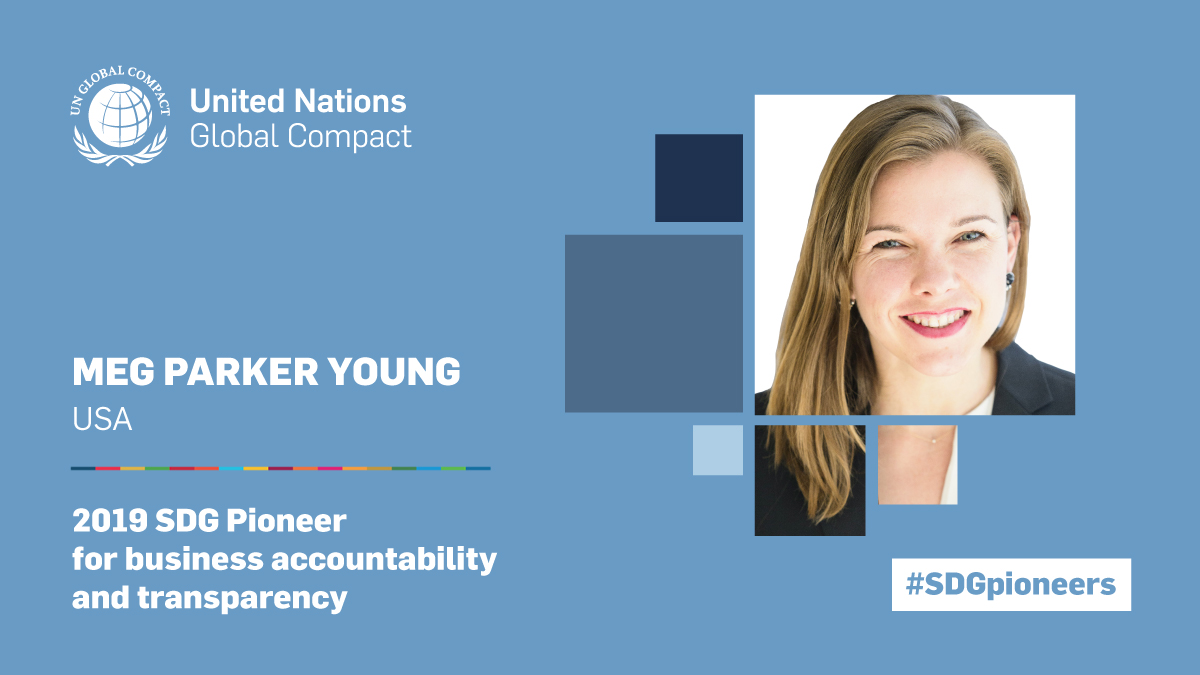An SDG Pioneer for business accountability and transparency

Meg Parker Young is using the power and reach of a global mass media and information firm to help make the world a safer, cleaner and more peaceful place.
As Director of Impact Strategy and Development at Thomson Reuters, Meg has helped craft a corporate impact strategy that has woven sustainability into its numerous legal, tax and media products as well as its global partnerships. The company’s commitment to Sustainable Development Goal 16 (Peace, Justice and Strong Institutions) is explicit in the chief executive officer’s vision to place justice and transparency at “the heart of everything we do.” With seemingly endless eagerness and drive, Meg and her team used a year of corporate transition to craft a wide-reaching impact strategy that will deliver precise outputs to support many of the Global Goals and the Ten Principles of the UN Global Compact. This work has tapped into the enthusiasm of more than 5,000 employees from the working level up. The chief financial officer, for example, is now developing his own voice around sustainability issues and the newsrooms’ female journalists are being featured at the vanguard of conversations on transparency and freedom of the press.
In support of Goal 16, Thomson Reuters has launched five new internal innovation campaigns and events to support access to justice and transparency; strategized on product rollouts focusing on giving underserved populations greater access to justice; and created new collaborations to support access to justice and transparency. In 2019, the Canadian multinational also joined the UN Global Compact Action Platform on Peace, Justice and Strong Institutions to help develop goals and action plans on this topic.
Overseeing the environmental, social and governance (ESG) portfolio, Meg also helped launch new corporate carbon targets, which support Goal 7 (Affordable and Clean Energy); Goal 12 (Responsible Consumption and Production); and Goal 13 (Climate Action). She and the social impact team worked with the company’s top executives to commit to targets for carbon neutrality for all global operations in 2019 and commitments for 100 per cent renewable energy sourcing and the integration of science-based targets in 2020. These targets also embed the environmental portion of the Ten Principles into the company’s strategy.
Meg works internally at Thomson Reuters to weave the Compact’s human rights and labour principles into its operations. For example, Meg and her team worked with the head of sourcing and others to renew the company’s commitment to the UK Modern Slavery Act 2015 by reviewing the supply chain ethics code. Her strategy also opened the door to partnering with colleagues who are working to detect ways to curb human rights abuses by analyzing human trafficking data.
To strengthen the company’s alignment with the Compact’s anti-corruption principle, Meg and her team are collaborating with internal innovation teams to identify and support opportunities to leverage the company’s expansive data and systems to further curb corruption, waste, fraud and abuses, such as through the company’s existing court modernization efforts.
Thomson Reuters has been participating in the UN Global Compact since April 2016. To support the United Nations General Assembly’s work surrounding Goal 16 and the implications for the legal sector, Thomson Reuters is co-hosting an event this September with Thomson Reuters Foundation’s TrustLaw team and the UN Global Compact Action Platform on Peace, Justice and Strong Institutions.
Meg is 34 years of age.
